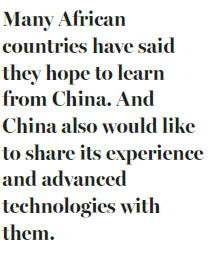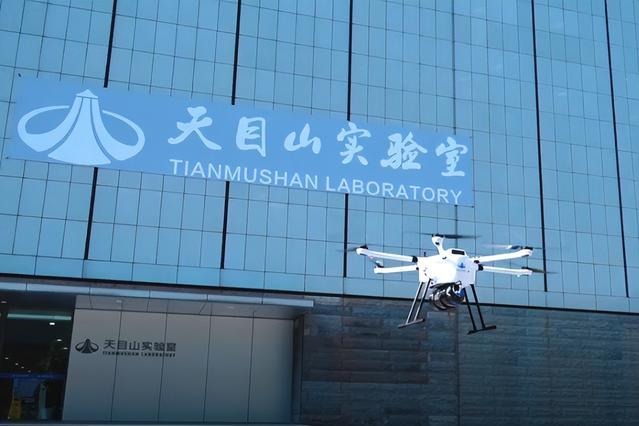Industrial transfer offers mutual benefits

With Belt and Road and manufacturing capability, Africa can become a new growth pole for global economic development
Since the establishment of the Forum on China-Africa Cooperation in October 2000, cooperation between China and Africa has continuously expanded and deepened.
The two sides jointly formulated and implemented a series of major initiatives to deepen their cooperation, and these have greatly promoted the rapid development of friendly and cooperative relations between China and Africa in various fields.
The Forum on China-Africa Cooperation was held successfully in Johannesburg, South Africa, in December 2015, which brought not only a new historical situation, but also opportunities, to the cooperation between the two sides. The world is more concerned than ever about how China and Africa will seize those opportunities to achieve win-win cooperation.

Some academics pointed out that, during the process of international industry transfer, investment countries should move the industries or businesses that have fewer competitive advantages at home to other countries in which those industries still have competitive advantages and great potential for development.
Such transfer can benefit both sides. The industrial transfer will provide opportunities to less-developed nations. Japan in the 1950s and 1960s, the Four Asia Tigers in the 1970s, and China in the 1980s are all examples that began their fast economic development through seizing the opportunities of international industrial structure adjustment and receiving international production capacity. The development experiences of those economies have proved that international industrial transfer is necessary and reasonable for developing economies.
In January 2015, Chinese Foreign Minister Wang Yi said in an interview in Kenya that China and Africa share highly complementary and mutual advantages in development. They have their own opportunities and need each other, Wang said. Many African countries are pursuing the policy of "looking eastward" and hope to strengthen mutually beneficial cooperation with China. China is speeding up the pace of opening-up to the Africa and continuously increasing its foreign investment and industrial transfer.
African countries are generally seeking industrialization and the diversifying development of economy. They are in urgent need of foreign investment and technology transfer from overseas.
China, on the other hand, has entered into a new stage of development. It has a large number of good industries and surplus productivities that are seeking overseas development.
African countries, with rich energy resources, minerals, land and a population of 1.1 billion, form a market with great potential. China, which is seeking economic transfer and industrial upgrading, has accumulated rich experience during its industrialization process. It also owns mature technologies, effective equipment, abundant capital, excellent enterprises and high-quality human resources, which are imperative to African nations.
Many African countries have said they hope to learn from China. And China also would like to share its experience and advanced technologies with them.

China and Africa are the community with a common future. Over the past decades, no matter how the international situation has changed, China and Africa have always been good brothers. The traditional friendship between China and Africa has become a common treasure of both sides. At the Johannesburg summit, China and African countries promised to establish a comprehensive strategic partnership based on political equality and win-win economic cooperation. That has provided a strong political impetus and guarantee for the development strategy synergy between the two sides.
At the Forum on China-Africa Cooperation in Johannesburg in December 2015, President Xi Jinping announced that China would further promote cooperation with African countries in 10 fields, including industrialization, agricultural modernization, infrastructural construction, finance and trade. This is a major plan that will open a new chapter in the relationship between China and Africa. It will help African countries to solve problems such as poor infrastructure and shortage of talent and capital, which are three bottlenecks that have prevented the development of the continent. The plan will also help African nations to build their own sustainable developing industrial mechanism.
In the past year, China and African nations have made progress in cooperation.
Capacity cooperation, infrastructure construction and agricultural development are the key points of the development strategy synergy of China and Africa. China-Africa capacity cooperation is based on mutual needs. African countries' industrial fundamentals are weak. They need more funds, iron and steel. Insufficient infrastructure development has been a major factor preventing economic growth on the continent. China has contributed to African nations in the past decades through building railways, roads, ports and airports.
Agriculture is a pillar industry in many Africa countries in which China and Africa have huge potential for cooperation. Agricultural demonstration centers and water conservancy facilities built by Chinese companies in Africa have played an important role in promoting local agricultural development.
China's Belt and Road Initiative also provides a historic opportunity for both sides. With the new round of international industrial restructuring and transfer, Africa can take the lead to benefit from the implementation of the Belt and Road and become a new growth pole for global economic development.
The author is director of The Center of Africa Studies of China Foreign Affairs University. The views do not necessarily reflect those of China Daily.
(China Daily Africa Weekly 08/04/2017 page13)
Today's Top News
- Evidence mounts of Japan's wartime atrocities
- Gunmen kill 11, wound many on Sydney beach
- Study finds Earth's deep water reservoirs
- China remembers victims of Nanjing Massacre 88 years on
- Philippines' provocations will avail it nothing: China Daily editorial
- China steps up financial support to spur consumption






























